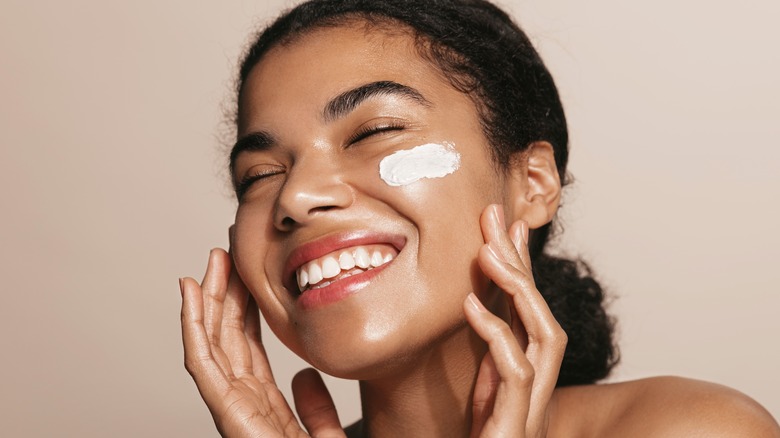What Your Circadian Rhythm Has To Do With Your Skin Care Routine
Ahh, young skin. Who doesn't want fresh, hydrated skin, the hallmark of beauty no matter a person's age? Skin is the body's largest organ, playing an essential role in your health by regulating your temperature, synthesizing vitamin D, and protecting you from external threats in the form of radiation and irritants. Recent research has shown that circadian rhythms — the 24-hour cycles of your body's internal clock that run your essential physiological functions, including your sleep-wake cycle — impact your skin's ability to heal and hydrate.
As you know, your skin takes a daily beating, fighting off both pollutants and sun rays. But at night, your skin is repairing the damage it sustained during the day. Per a study published by the National Library of Medicine, researchers have looked into the differences between "morning skin" versus "evening skin" and found that skin temperature, skin oils, and even transepidermal water loss — the amount of water vapor evaporating from the surface of your skin— varies throughout the day.
These "time-dependent rhythms" routinely affect skin hydration, one of the most fundamental indicators of healthy, vibrant skin.
The rhythms of a day ... and a lifetime
Other important characteristics of your complexion are also known to be influenced by circadian rhythms. Levels of keratinocytes, the cells in your skin's outermost layer that provide it with structure, are impacted by the sun's passage across the sky. So, too, is skin blood flow. One scientific study found that your skin is more permeable in the evening. This suggests that some skincare products may be more beneficial (and cost-effective) if you apply them in the evening.
It's possible, too, that hormones affect your skin's circadian rhythms and this, in turn, challenges certain dynamic properties of your skin. A very small scale study conducted in France found that women who used oral contraceptives had higher average rates of skin blood flow — and also transepidermal water loss — than women not using oral contraceptives. "It has been suggested that oral contraceptives alter an individual's sensitivity to light and consequently the circadian rhythm of melatonin," wrote the authors. Pregnancy, a time of fluctuating hormones, also triggers different circadian effects in your skin.
Possibly the most interesting scientific finding is that the skin's beneficial circadian cycles may dwindle as we get older. One study comparing groups of old and young people found that, in the evening, skin metabolites associated with damage were at high levels within the young group. Overnight, though, their skin performed repairs and showed enriched metabolites in the morning. Strikingly, this same natural rhythm of repair as measured by metabolites did not appear to have occurred in the older group.
Knowing your skin
The affects of skin's circadian rhythms have not been proven for all aspects of skin health. For example, two different studies came to opposite conclusions about skin reddening. "One study exposed buttock skin of human volunteers in either the morning or evening with increasing ... UVB light ... and then examined skin reddening," the authors wrote in a piece published by the National Library of Medicine.
This experiment showed a higher level of skin reddening during the evening than in the morning. By contrast, another study that used a light source that mimicked the sun's rays found more skin reddening in the morning than in the evening. These opposite conclusions might have been caused by the different light sources used in the two experiments, according to the study authors. Either way, both studies suggest that epidermis does not burn uniformly throughout a 24-hour day. Instead, circadian rhythms influence your skin's ability to tan, glow and darken.
So, how do you make all this data work for you? Why not begin by appreciating your hard-working skin. Then, try to be more aware of how your complexion looks — how it reacts to heat, stress and the general environment — at different times of day. Be conscious and choosy with products. Experiment not only with what you apply for skincare but when. Finally, remember that hydration is mainly an inside job, so enjoy another glass of H2O.


